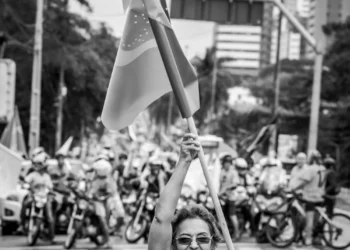by Gülşen Doğan
Reviewed by Matheus Lucas Hebling
Populism manifests differently in various geographies due to different national frameworks, including political history, system, and culture. However, a common thread among populist movements is their claim of embodying the people as the voice of the people and the outsider opposing the morally compromised ruling elite, be it at a local or global level (Barr, 2009; Moffitt, 2016; Mudde, 2013; Müller, 2015). Accordingly, the primary focus of this blog article is on how the discourse of right-wing populism is addressed in Brazil. Bolsonaro, a right-wing populist, frequently employed polarizing language to appeal to followers, but his messaging also included different degrees of identity-centered themes. Pronounced political divisions and unique populist rhetoric characterized his period of governance. These divisions were predominantly influenced by economic, social, and cultural dimensions, which Bolsonaro skillfully exploited to fortify his constituency. His populist rhetoric was especially marked by a pronounced antiestablishment attitude, a strong sense of nationalism, and an emphasis on law and order, which appealed to a heterogeneous voter demographic.
Zucco and Power (2021) categorized right-wing politics in Brazil into four distinct groups: Firstly, the “authoritarian nostalgia” faction upholds the military dictatorship’s legacy, opposes human rights initiatives, and aligns with the security sector and gun advocacy. This segment, previously peripheral, experienced a surge in influence following Bolsonaro’s rise. Secondly, the religious right, associated with neo-Pentecostal churches, advocates for the “defense of family” and pursues a conservative “culture war” agenda. Throughout the 2018 electoral campaign, well-coordinated networks of Pentecostal priests served as a crucial means of communication for Bolsonaro, effectively capturing the attention of Brazil’s evangelical population (Franzen, 2022). The Bolsonaro government had a longstanding association with the Evangelical church, which can be traced back to the military’s utilization of the Catholic Church to smoothen the transition from military governance to democracy in the 1980s (Tatarczyk, 2018; Mohan and Padmanabhan, 2022).
Thirdly, the economic right, with limited impact, supports free-market and “neoliberal” policies while displaying less enthusiasm for other conservative causes. Lastly, the clientelistic and opportunistic right, known as “the Centrão,” lacks ideological solid convictions and primarily prioritizes employment, corruption, and favors. This group thrives within “rent-seeking parties” and tends to align with the federal government whenever advantageous, as seen during Lula’s administration. Highly pragmatic, they have contributed to the fragmentation of political parties on the right despite their numerical superiority. Following the 2013 protests, these factions rallied behind Bolsonaro in opposition to the PT. The Centrão played a pivotal role in the impeachment of Dilma Rousseff and the subsequent ascension of Michel Temer during 2013-2016.
In light of the increasing influence of right-wing populism, societal divisions have given rise to emotional polarization, leading to the formation of pro-PT (Workers’ Party, PT) and anti-PT factions, which eventually evolved into pro-Bolsonaro and anti-Bolsonaro sentiments, commonly known as antibolsonarismo after Bolsonaro’s term. Bolsonaro’s populist rhetoric was strikingly anti-establishment, explicitly targeting the political elite and media conglomerates. He framed himself as a non-establishment figure capable of contesting the prevailing order, employing slogans such as “Brazil above everything. God above everyone,” which resonated with nationalist sentiments observed in various nations (Silva, 2020). Shortly before Bolsonaro’s electoral victory, Brazil found itself grappling with four concurrent crises: a financial crisis resulting from a prolonged period of economic downturn, a political crisis marked by escalating polarization and a diminishing trust in established political factions, a corruption crisis spotlighted by the Lava Jato probe, and a further deterioration of an already precarious public security landscape.
Bolsonaro exploited this situation by campaigning for “law and order” in Brazil while advocating a robust anti-corruption stance that deeply resonated with the public (Pearson and Paulo Trevisani, 2018). His highlighting of his military background during Brazil’s past military rule (1964-85) enhanced his image as a strong leader committed to combating crime. As a result, his discourse mainly exploited the antiestablishment divide, rooted in a widespread feeling of pervasive disillusionment with the political sphere and its actors and the antipetista divide, revolving around the desire among numerous voters to administer belated retribution to the PT.

His communicative approach was straightforward and frequently provocative, contributing to his sustained visibility and effective engagement with his constituents. This methodology indicated a more significant phenomenon wherein right-wing populists leverage digital media to circumvent traditional media outlets. Bolsonaro’s rhetoric highlighted ethical and cultural concerns, frequently juxtaposing them with the left-leaning PT. He invoked concepts of nationalism, xenophobia, and a robust state apparatus, appealing to conservative ideologies and a yearning to revive traditional societal norms (Dalmonte & Dibai, 2019). His discourse incorporated facets of right-wing extremism, including anti-communist sentiments and an affirmative perspective on Brazil’s military dictatorship. This narrative resonated with specific demographics within the populace who were disenchanted with democratic frameworks and yearned to restore perceived historical grandeur (Mattos, 2022). Bolsonaro’s ascendance was notably facilitated by his calculated media utilization, mainly social media platforms like Twitter. Similarly, Davis and Straubhaar’s (2020) content analysis on the social media campaign of Bolsonaro clearly shows that antipetismo discourse mobilized the general unrest against the PT before the 2018 elections and paved the way for Bolsonaro’s presidency.
Da Silva’s (2019) discourse analysis on public events, social media, news broadcasts, and private speeches of Bolsonaro also shows how Bolsonaro openly used an antiblack discourse and denied racism and race-targeted policies during his campaign and presidency. Historically, Brazil has been identified as one of the nations that experienced colonization, resulting in a society characterized by race-based diversities. Racial, socioeconomic, and regional disparities exist in Brazil but are not inherently incompatible. For example, Brazil’s socioeconomic inequality is divided into the North and South regions. However, Brazil has not experienced militant separatism, where the separatists claim an ethnicity-based separation and a state formation. Instead, social division is prominent concerning the infrastructural capabilities of different states, income disparities among the populace, and educational unevenness within society. In other words, despite the regional and racial heterogeneity within the country, subnational origin and skin color have not been intensely politicized. This historical development, however, has contributed to the emergence of socioeconomic inequalities and the influential role of elites in Brazilian politics (Lustig et al., 2013; Schneider, 2015) and notably, between 2003 and 2010, the period marked a significant shift in Brazilian economic growth under President Lula’s inclusionary populist policies, leading to increased wages, poverty alleviation, and improved living conditions. This transformative phase was instrumental in fostering economic expansion characterized by low inflation rates, higher minimum wages, enhanced standards of living for those in lower socioeconomic strata, and decreased poverty levels (Yarar, 2019).
During the PT government, challenges, however, emerged predominantly about the escalating economic downturn, surge in urban violence, and inquiries into governmental corruption (Operation Car Wash/Operação Lava Jato) (Akkoyunlu et al., 2021, p. 9). Ultimately, this led to the impeachment of President Rousseff, marking the beginning of Michel Temer’s interim presidency, who advocated for neoliberal strategies but faced disapproval from the electorate due to his entanglement in corruption probes and the disqualification measures targeting Lula. Bolsonaro adeptly exploited the prevailing economic vulnerabilities and public discontent regarding austerity policies, echoing the strategies of his predecessor, Lula, albeit emphasizing themes of insecurity and corruption (Iacoella et al., 2020). Bolsonaro’s constituency predominantly comprised the middle class, who perceived themselves at risk due to economic volatility and alleged corruption. His discourse emphasizing law and order resonated with this demographic, which had grown disenchanted with conventional political elites and yearned for a robust leader to reestablish stability.
While Bolsonaro’s populist approaches effectively inspired support, they exacerbated pre-existing societal divisions and polarized the political milieu. His emphasis on nationalism, antiestablishment discourse, and cultural conservatism resonated with numerous Brazilians yet encountered considerable opposition. Consequently, the Bolsonaro administration underscored the intricate interplay between economic, social, and cultural dimensions in forming right-wing populist movements within contemporary democratic contexts.
References
Akkoyunlu, Karabekir. 2021. “Efficiency, Merit, and Privilege: Public Administration Reforms in Brazil and Turkey.” Revista do Serviço Público 72 no.1: 200–231.
Barr, R. R. 2009. “Populists, Outsiders, and Anti-Establishment Politics”. Party Politics, 15 no. 1: 29–48.
da Silva, A.J.B. and Larkins, E.R. 2019. “The Bolsonaro Election, Antiblackness, and Changing Race Relations in Brazil”. The Journal of Latin American and Caribbean Anthropology.
Dalmonte, Edson and Priscilla Dibai. 2019. “A direita radical ‘bolsonarista’: da aporofobia à defesa da memória de regimes de exceção”, IdeAs [En ligne], 14. https://doi.org/10.4000/ideas.6895
Davis, S., & Straubhaar, J. 2020. “Producing Antipetismo: Media activism and the rise of the radical, nationalist right in contemporary Brazil”. International Communication Gazette, 82 no.1: 82-100
Franzen, Niklas. 2022. “How Bolsonaro is breaking the divide between the State and church”. IPS. https://www.ips-journal.eu/topics/democracy-and-society/how-bolsonaro-is-breaking-the-divide-between-state-and-church-6168/
Iacoella, F., Justino, P. , Martorano, B. 2020. “Roots of dissent: Trade liberalization and the rise of populism in Brazil”. WIDER Working Paper 2020/118. Helsinki: UNU-WIDER. https://doi.org/10.35188/UNU-WIDER/2020/875-7
Lustig, Nora and Pessino, Carola and Scott, John. 2013. “The Impact of Taxes and Social Spending on Inequality and Poverty in Argentina, Bolivia, Brazil, Mexico, Peru, and Uruguay: An Overview”. Public Finance Review, 42.
Mattos, Marcelo Badaró. 2022. “Governo Bolsonaro Neofascismo e autocracia burguesa no Brasil”. Relações Internacionais Março 73: 25-39
Mohan, D., & Padmanabhan, A. 2022. Strongmen Saviours: A Political Economy of Populism in India, Turkey, Russia and Brazil (1st ed.). Routledge. https://doi.org/10.4324/9781003298694
Mudde, C. 2013. “Three Decades of Populist Radical Right Parties in Western Europe: So What?” European Journal of Political Research 52 no. 1.
Müller, Jan Zielonka. 2015. “Parsing Populism: Who Is and Who Is Not a Populist These Days?” Juncture 22, no. 2: 80–89.
Schneider, B. (2015). “The developmental state in Brazil: Comparative and historical perspectives”. Revista de Economia Politica, 35.
Silva, F. de S., Queiroz, R. C. de S., Branco, M. dos R. F. C., Habenschus, M. I. A. T., Scorzafave, L. G., Saraiva, M. da C. P., Bettiol, H., Barbieri, M. A., Rodrigues, M. A. F. R., Barbosa, Y. C., Simões, V. M. F., and Silva, A. A. M. da. 2019. “Foco e Cobertura do Programa Bolsa Família em Crianças das Coortes de Nascimento BRISA, Ribeirão Preto (São Paulo) e São Luís (Maranhão), Brasil.” Cadernos de Saúde Pública 35, no. 6.
Tatarczyk, Dawid, 2018. “The Catholic Church and Its Impact on Public Policy in Contemporary Democracies” Dissertations 3303.
https://scholarworks.wmich.edu/dissertations/3303
Yarar, Eralp. 2019. “The Effects of Political Regime Type on Income Inequality: A Comparative Analysis of China And Brazil”. Koç University Thesis. https://acikbilim.yok.gov.tr/bitstream/handle/20.500.12812/167203/yokAcikBilim_10283886.pdf?isAllowed=y&sequence=-1
Zucco, Cesar, Jr. and Timothy J. Power. 2021. “Fragmentation Without Cleavages? Endogenous Fractionalization in the Brazilian Party System”. Comparative Politics, 53 no.3: 477-500.
—–
Gülşen Doğan is a Ph.D. candidate in Political Science and International Relations at Koc University. She graduated summa cum laude from Bogazici University with a B.A. in Political Science and International Relations & Sociology. She received her M.A. degree from International Relations at Koc University with a thesis on the institutional and ideological conditions for the extent of executive aggrandizement in Turkey and Brazil in the last decade. Her research interests lie in the intersection of populism, democratic backsliding, political economy, governance, political parties, migration diplomacy, and disaster diplomacy. In terms of area studies, she studies on Turkey, Brazil and the EU. During her undergraduate studies, she chaired the Center for European Studies Student Forum (CESSF). It is a forum that organizes academic meetings and publishes analyses and policy recommendations on the processes of EU politics and EU-Turkey relations. In 2022, she also worked as a non-resident research assistant in Turkey program at the Middle East Institute (MEI). Between 2020 and 2023, she worked as a researcher and editor in Democratization and Development Programs at an Istanbul-based think tank, Istanbul Political Research Institute (IstanPol). Currently, she works at MiReKoç (Migration Research Center at Koç University) as a project researcher for the Horizon Europe Twinning project: BROAD-ER (Bridging the Migration and Urban Studies Nexus).
Doğan, Gülşen. 2024. "Cleavages and Right-wing Populist Discourse in Brazil: The Bolsonaro Era in Focus". Brazilian Research and Studies Blog. ISSN 2701-4924. Vol. 3 Num. 1. Available at: https://www.bras-center.com/cleavages-and-right-wing-populist-discourse-in-brazil-the-bolsonaro-era-in-focus/, accessed on: April 13, 2025.








